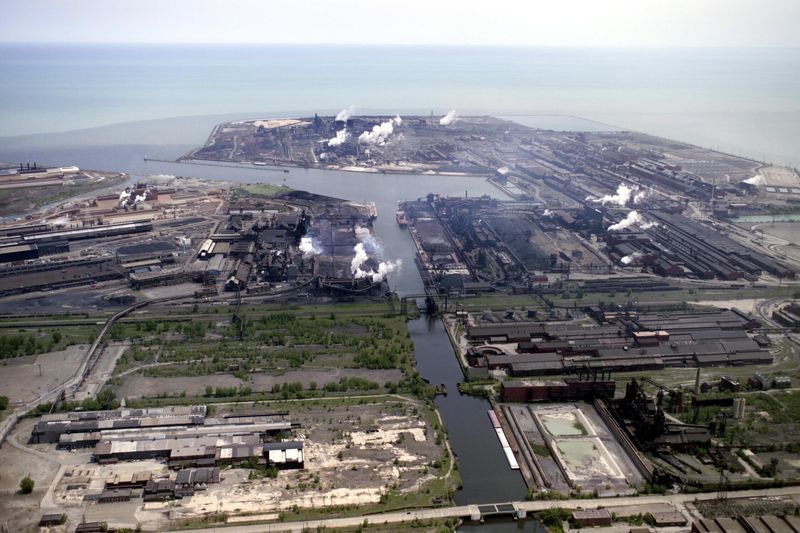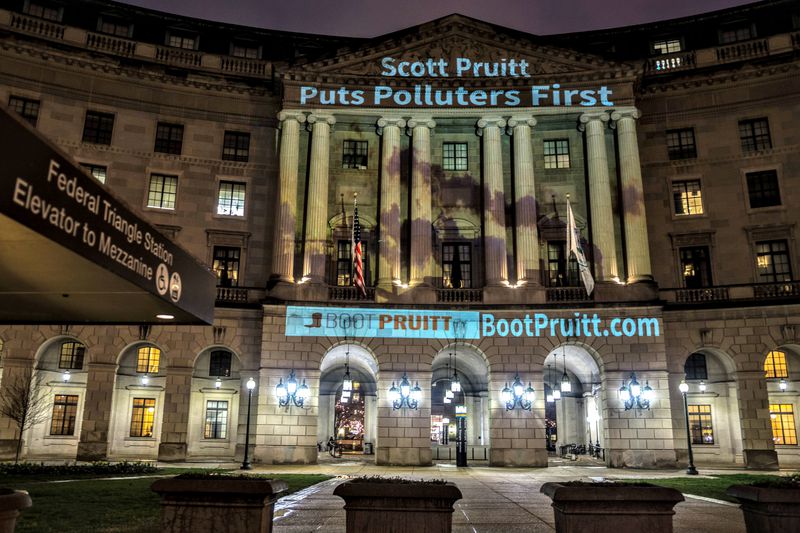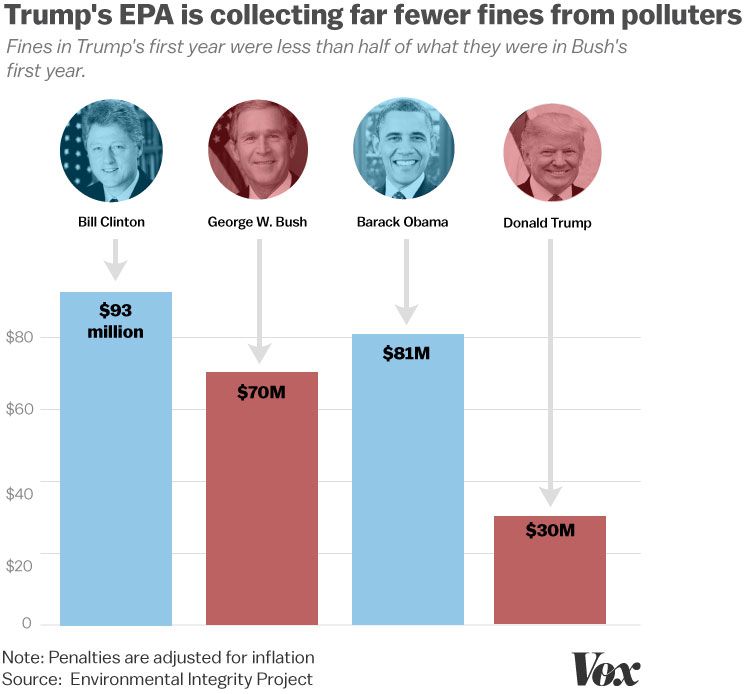Automakers, agriculture, coal, chemicals, and heavy truck makers all got regulatory relief from Pruitt.
Scott Pruitt’s sudden exit as administrator of the US Environmental Protection Agency on Thursday was the culmination of a stunning list of scandals after leaks and reports revealed that he’d turned his office into a virtual ethical Superfund site.
Yet even on his way out the door, Pruitt managed to give a parting gift to one of the industries the EPA is supposed to regulate: manufacturers of “super polluting” trucks, who wanted to keep open a loophole the Obama administration tried to eliminate.
Michael Grunwald at Politico made the case earlier this year that Pruitt’s effectiveness at the EPA is overstated. Much of his work in undoing EPA regulations has been theatrical announcements with flimsy technical pretexts that will wither under legal challenges.
But while making (or unmaking) environmental rules is a process that takes years, the industries that chafe most at EPA regulations — automakers, big farmers, coal barons, and chemical manufacturers among them — found plenty of opportunities to celebrate during Pruitt’s time in office. And these gains for industry come at the expense of the health of all of us, particularly the poor and minorities.
“A central feature of [Trump’s] agenda is environmental damage: making the air dirtier and exposing people to more toxic chemicals,” wrote researchers Francesca Dominici and David Cutler in the Journal of the American Medical Association Forum. “The beneficiaries, in contrast, will be a relatively few well-connected companies.”
 Tigerhill/John Hill/US Army Corps of Engineers, Chicago District
Tigerhill/John Hill/US Army Corps of Engineers, Chicago DistrictHere are some of the biggest beneficiaries of Pruitt’s tenure at the EPA, and who may continue to receive favorable policy treatment under his successor, Acting Administrator Andrew Wheeler. This list is by no means exhaustive.
Glider kit manufacturers caught a huge break for their massively polluting trucks
On Friday, Pruitt’s last day, he signed off on a massive pollution exemption for glider kits. These are new truck bodies using salvaged engine components.
They were intended as a way to recover hardware in damaged trucks. However, these engines are held to lower emissions standards, so glider kits quickly became a growing loophole to avoid buying expensive hardware to control pollutants like nitrogen oxides and particulates. The EPA found that glider trucks can emit upward of 55 times the pollution of trucks equipped with modern pollution controls. If current trends hold, glider trucks would account for half of all nitrogen oxide pollution from trucks by 2030.
A small group of manufacturers sprung up to exploit this, but the Obama administration set a cap of 300 new glider trucks that was supposed to take effect this year. However, Pruitt’s EPA told manufacturers last Friday that it would not enforce this cap for two years as it works to repeal the cap for good.
“Our goose was cooked until President Trump and Pruitt came to town,” wrote Tommy Fitzgerald Sr., CEO of Fitzgerald Glider Kits, the largest US glider truck manufacturer, in the Daily Caller.
Auto companies got a freeze in fuel economy standards
In April, Pruitt announced that the EPA will freeze corporate average fuel economy standards (CAFE), arguing that the trajectory launched by the Obama administration would be too difficult for manufacturers to hit.
The transportation sector is now the largest greenhouse gas emitter in the United States and vehicles are the biggest source of air pollution. The Union of Concerned Scientists estimated that the Obama-era rules would avert 570 million metric tons of greenhouse gas emissions by 2030, equivalent to stopping 140 typical coal-fired power plants for a year.
The announcement was huge relief for some automakers who say that US consumers want larger, thirstier cars, especially with relatively low gas prices. Ford said earlier this year that it is phasing out production of sedans altogether.
Lower fuel economy standards mean that manufacturers won’t have to invest as much in coming up with more efficient engines while allowing them to sell more high-margin products like SUVs and pickup trucks.
 Umair Irfan
Umair Irfan“This was the right decision, and we support the Administration for pursuing a data-driven effort and a single national program as it works to finalize future standards,” the Alliance of Automobile Manufacturers, a trade group representing 70 percent of car and light truck sales in the US, wrote in a statement.
However, the weakened standard hurts carmakers that already have fuel-efficient fleets like Toyota and Honda, and it shrinks a key revenue stream for electric car manufacturer Tesla. That’s because these companies all make money selling clean car credits to other companies.
And as Robinson Meyer at the Atlantic noted, even as they got what they wanted, some carmakers got cold feet from being so closely linked to a Trump administration policy:
Initially, Pruitt had planned to announce the CAFE rollback on April 3 at a Chevrolet dealer in Virginia. But other Chevy dealers hated that idea, and the administrator canceled the event. Soon other automakers had backed off the administrator. “We support increasing clean car standards through 2025 and are not asking for a rollback,” wrote Bill Ford, the executive chairman of the eponymous automaker, in a Medium post. A Honda vice president told The New York Times: “We didn’t ask for that.”
Perhaps they remembered that Democrats, liberals, environmentalists, and Californians buy cars too.
Big agriculture received a reprieve from water and pesticide regulations
One of the most controversial environmental regulations under the Obama administration was the Waters of the United States rule issued under the Clean Water Act. The regulation was meant to clarify what waterways fall under federal jurisdiction.
About one-third of Americans get their drinking water from the waterways regulated under WOTUS.
However, farmers, ranchers, and property developers saw it as a federal land grab. So they were quite pleased when Pruitt announced that he would delay the rule from going into effect for two years.
“Today’s announcement is part of a measured and thoughtful process to provide regulatory certainty to farmers and ranchers while the agencies continue the important work of withdrawing and rewriting the unlawful 2015 WOTUS rule,” wrote American Farm Bureau Federation President Zippy Duvall in a statement in January. “Without today’s action, countless farmers and ranchers, as well as other landowners and businesses, would risk lawsuits and huge penalties for activities as common and harmless as plowing a field.”
The EPA still has to come up with an alternative to the Obama-era regulation, but what they have in the works is likely going to be a much weaker standard.
Another key victory for big agriculture was the EPA’s decision not to ban the pesticide chlorpyrifos, contradicting the agency’s own recommendations. The pesticide is linked to neurological damage and developmental delays, particularly among young people. Coincidentally, the EPA also proposed changes to pesticide handling rules that would lift minimum age limits to handling these substances.
The chemicals industry got a lower bar to clear
Chemicals manufacturers also benefitted from Pruitt’s time in office. The EPA weakened a key chemical safety protection law, the Toxic Substances Control Act. The agency limited what chemicals it would review and restricted the kinds of harms it would consider in its safety evaluations.
Reviews of flame retardants like asbestos were also halted at the EPA.
Facilities that emit hazardous chemicals were also exempted from the “once in, always in” rule, which could allow heavy polluters to backslide and let more dangerous substances into the air.
“The regulated community has long opposed this policy and EPA’s enforcement of it as if it were a rule,” wrote Anna Burhop of the American Chemistry Council, a lobbying group for chemicals manufacturers, in a comment letter to the EPA.
Pruitt’s EPA also dialed back enforcement, collecting less than half the amount of fines from polluters in the Trump Administration’s first year in office compared to the same time period under the last three presidents.
 Christina Animashaun/Vox
Christina Animashaun/VoxThe EPA Risk Management Program, also known as the Chemical Disaster Rule, has been delayed by more than a year. The measure emerged after a string of chemical accidents in the United States in 2013 to add new safety requirements to chemicals facilities.
The EPA did grudgingly introduce new chemicals rules moving forward with a proposal to ban methylene chloride, a substance found in paint strippers that has killed people.
Fossil fuel companies breathed easier under Pruitt
The day before Scott Pruitt was sworn in at the EPA, Trump repealed the stream protection rule, a regulation meant to protect waterways from mining waste.
“This is one very, very important step to get coal back on its feet and stop the hemorrhaging of jobs that we’ve seen,” said Luke Popovich, a spokesman for the National Mining Association, a trade group.
Pruitt quickly picked up the baton. After pushing Trump to withdraw from the Paris Climate Accord, Pruitt started the process of repealing the Clean Power Plan, Obama’s signature policy for controlling greenhouse gas emissions from power plants.
“The Clean Power Plan would devastate coal-fired electricity generation in America as well as the United States’ coal industry,” said Bob Murray, CEO of Murray Energy, the largest underground coal mining company in the US, during a public hearing.
The EPA is also in the process of loosening rules on coal ash disposal sites, deferring management authority to state regulators. “The EPA estimates that these sites are responsible for at least 30 percent of all toxic pollution coming from industrial pollution,” Frank Holleman, senior attorney for the Southern Environmental Law Center, told the Daily Beast.
But even some conservatives thought Pruitt’s subservience to the coal industry was too much. Republican strategist Rick Wilson writing in the Daily Beast:
Like much of Trump’s energy policy, their fetishization of coal seems to contain a weird, Rule 34-ish desire to see hearty men headed down-pit with pickaxes and wearing helmets with sputtering carbide lamps. It’s not happening. It’s never happening. It’s a dead industry—dirty, inefficient, and outdated. Obama didn’t kill coal; natural gas and solar killed coal, and nothing Pruitt could do is going to bring it back.
Pruitt also delayed new regulations on methane emissions. Methane is the main ingredient in natural gas and is also a potent greenhouse gas. And he signed off on the Alberta Clipper tar sands pipeline. Pruitt at one point rented a condo from the wife of the lobbyist whose firm represented the company behind the pipeline, Enbridge.
Much of Pruitt’s EPA agenda will continue under Acting Administrator Andrew Wheeler
Andrew Wheeler, who took over the EPA as acting administrator on Monday, is proudly picking up Pruitt’s baton. Wheeler previously worked at the EPA in the toxic chemicals office and lobbied for several companies, including Murray Energy.
Acting EPA Chief Plans to Stick With @POTUS Trump’s Priorities via @WSJhttps://t.co/DDrp5utV5L
— Acting Administrator Wheeler (@EPAAWheeler) July 9, 2018
“If the environmentalists think [Trump is] going to make promises and we’re going to do the opposite, then there’s not a lot of common ground to work on,” Wheeler told the Wall Street Journal. “I’m going to continue to move forward with those” priorities Pruitt laid out on behalf of Trump.
However, he said that he is explicitly trying to turn down the political heat around the agency, perhaps in hopes of drawing less scrutiny than his predecessor.
“You might see a shift in terms of how I talk about some things,” Wheeler told the Wall Street Hournal. “I have thought for years environmental issues need to be depoliticized. In 1991 when I came to town they were not as politicized as they are today. And I would love to return to that.”
That means Wheeler will likely continue running up the score on behalf of the same interests that Pruitt set out to serve but with a much lower profile. Environmental activists in turn are keeping up the pressure to limit what Wheeler can accomplish.
“We won’t let him get away with it,” wrote Mary Anne Hitt, director of Sierra Club Beyond Coal Campaign. “All of the energy and passion that went into #BootPruitt will continue, focused on Andrew Wheeler and making sure the EPA returns to its mission.”
Read More
https://cdn.vox-cdn.com/community_logos/52517/voxv.png



